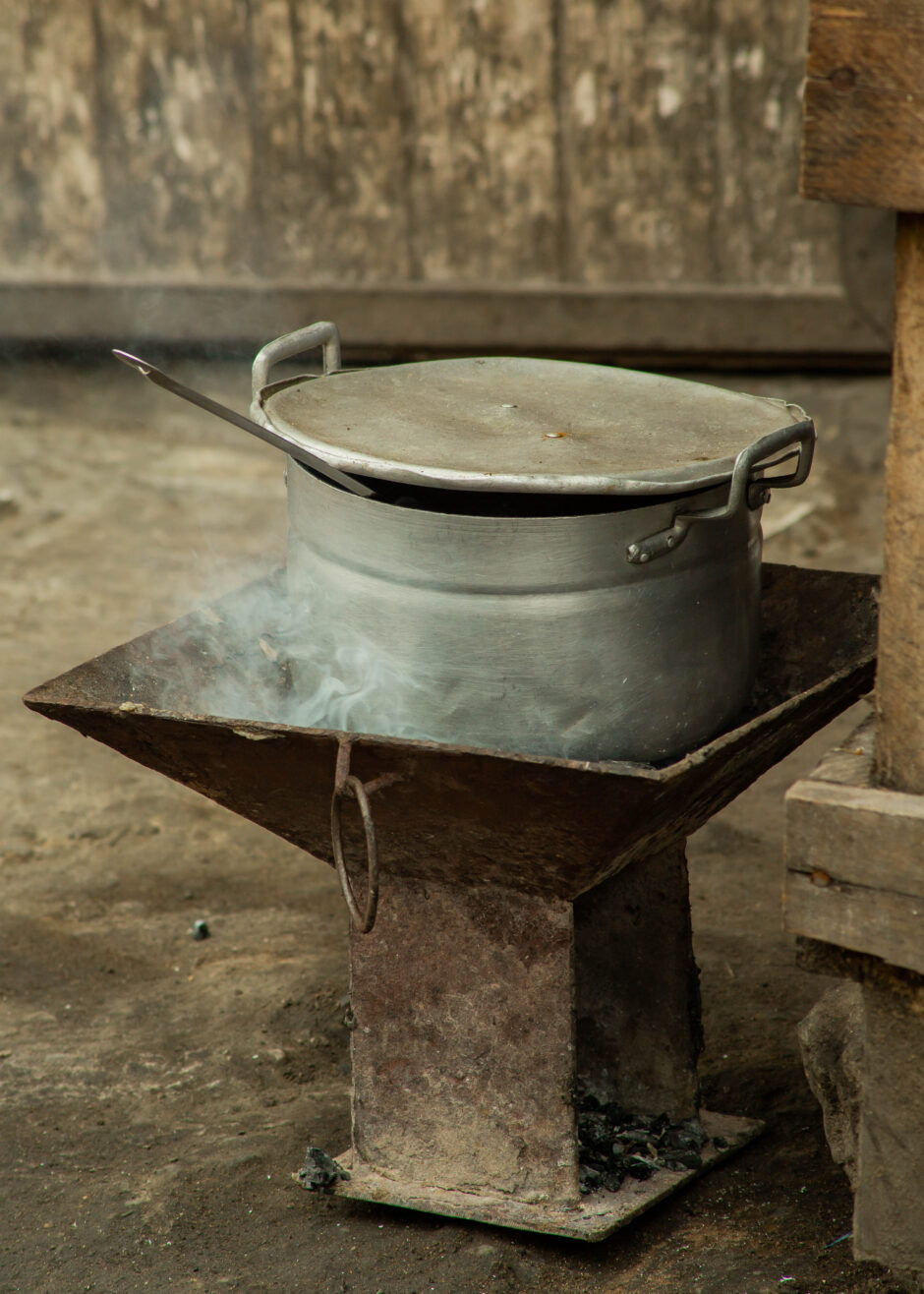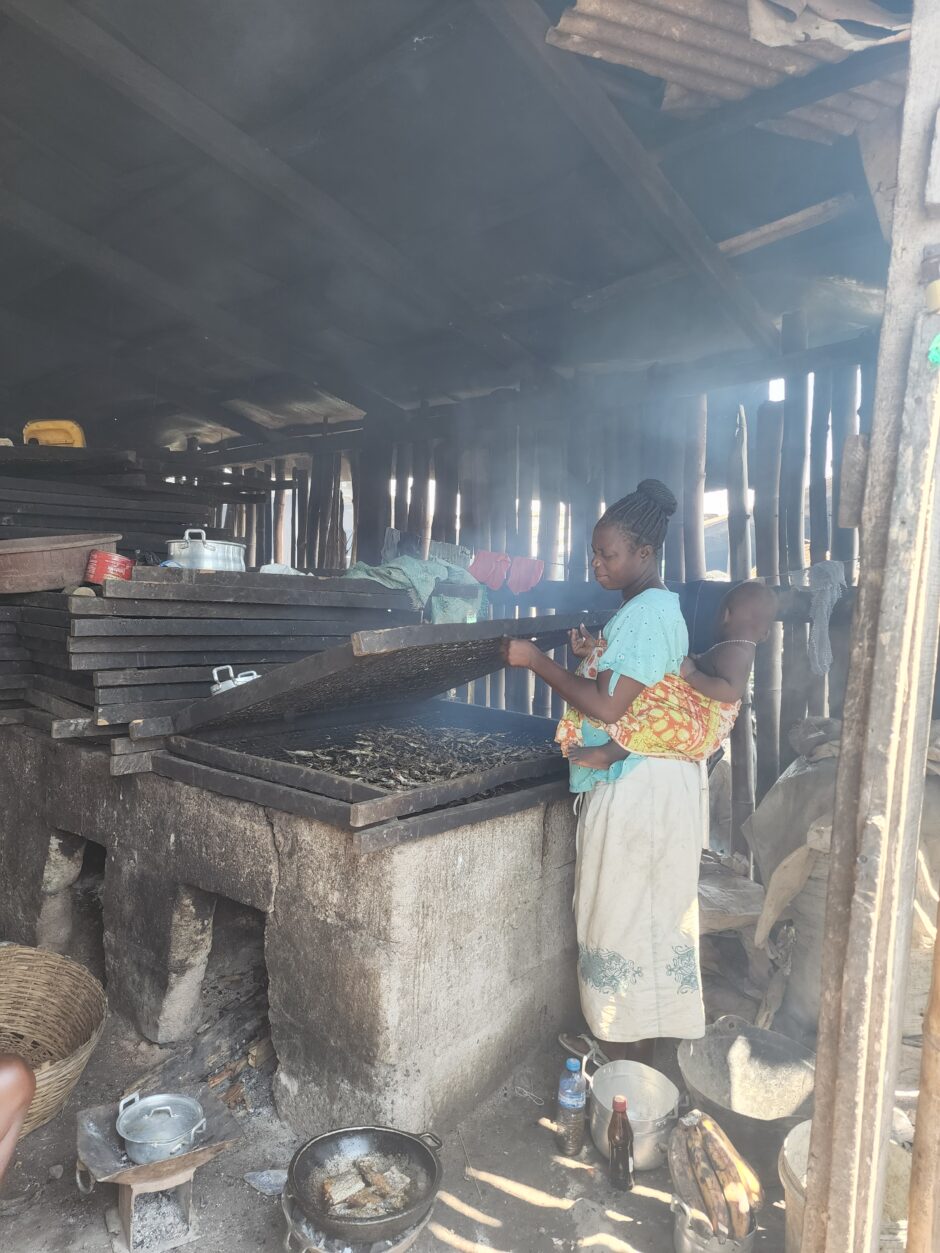
By Tina S. Mehnpaine with New Narratives
Deborah Ellis was like most Liberians when it came to cooking. She held on to her traditional cookpot, and changing to an imported cookstove was not an option. “I didn’t trust it,” Ellis says.
But one day her traditional cookpot was damaged, and she decided to give a cookstove a try. Now she only uses the cookstove. “It produces less smoke, more heat, and less ashes, and cooked food faster,” Ellis says.
A change to cleaner cookstoves from the open fire and three-stone methods of using cookpots is crucial to both the country’s health and environment, according to environmental experts and the United Nations. Liberia each year is losing thousands of acres of forests that are cut down to produce charcoal. This increases climate change, flooding, and air pollution. Cookpots are often used in confined areas with little ventilation, exposing families to diseases such as asthma, lung disease, pneumonia, and cancer.
A combination of factors has caused Liberia to lag far behind its goals to change to healthier and more environmentally protective cookstoves. Liberian manufacturers of cookpots and cookstoves say they face high costs in finding and importing parts, in addition to marketing and distribution problems.
The few imported cookstoves available are cheaper than some locally produced cookpots because of credits paid by polluters in other countries, but even they may be too expensive, particularly in rural areas.
Others say the government, which officials acknowledge doesn’t keep track of how many imported cookstoves are in the country, hasn’t focused enough on the effort and is underfunded. One of the biggest issues is how to persuade Liberians to make the switch from generations of cookpot use, even if, like Ellis, they can afford a cleaner cook stove that uses less charcoal and releases less carbon dioxide and other potentially dangerous gasses into the atmosphere.
“Even introducing clean cookstoves there has to be a lot of awareness so that people understand the benefits it brings to their health. The benefits it brings to the economy,” Nathanial Blama, former head of the Environmental Protection Agency (EPA), says. Using less charcoal also means more funds for other family expenses.
Blama says clean cookstoves reduce dependence on forests to produce charcoal, but should only be considered a short-term solution and that Liberia has to transition to gas stoves eventually. About a quarter of Liberians have access to electricity, according to a 2020 World Bank Report, and only 8 percent are in rural areas, so electric stoves aren’t a possibility for many.

The air quality in Liberia is moderately unsafe, based on limited data, according to the World Health Organization. The level of air quality has a considerable impact on health, and reducing air pollution—especially among vulnerable groups, including children, the elderly, and pregnant women — is an urgent priority.
“You see people that don’t smoke but have respiratory problems,” says Dr. Emmanuel Ekyinabah, a consultant physician at the John F. Kennedy Medical Center and member of the A.M Dogliotti College of Medicine. “They have cancer and breathing problems caused by inhaling charcoal smoke.”
Exposure to charcoal smoke has long been known as dangerous to human health, but the practice of producing charcoal can also be disastrous to the environment. Deforestation decimates Liberia’s forests, which contain half the remaining rainforests in West Africa, and could eventually turn them into wastelands, experts warn.
Liberia has fallen far short in meeting its goals to address the environmental and health challenges of deforestation. In 2015, Liberia was among 196 countries that signed the Paris Agreement to reverse global warming by drastically reducing the use of “fossil fuels” – gas, oil, and charcoal. And Liberia was among 141 countries that pledged to halt and reverse forest loss by 2030. Two years later, experts say, the government has done little.
Meanwhile, the charcoal sector has become one of the most active industries in Liberia. A 2019 World Bank report stated that about 337,000 tons of charcoal — worth US$46 million — was sold in 2018, employing 28,000 people.

The most effective way to immediate change, all agree, is to produce and distribute cookstoves. But local producers say they are beset with challenges. The German Development Cooperation (GIZ), through its jointly supported program Energising Development, has trained artisanal cookstove producers like Red Fire Pot by providing funds to help strengthen their businesses and has been a leader in bolstering the production of cookstoves in Liberia and other countries.
“The market for improved cookstoves in Liberia is rather nascent. Many of the challenges we observe are quite common in new markets,” says Elton Reeves, adviser on the clean cooking industry at EnDev-GIZ. “Limited awareness about the benefits, underdeveloped distribution networks, and supply chain constraints pose substantial hurdles.”
Bolstering the local production is one way to increase the number of cookstoves. The other is by import. Carbonibus, a private carbon offset project, offers a small number of imported cookstoves that sell for less than US$40, the result of carbon offsetting. Deborah Ellis, who reluctantly switched from a cookpot, has one.
The program provides clean cooking stoves for a cost of $35 and $25, depending on size, a portion of market value, says Kate Bakal, co-founder and head of programs for Carbonibus in Liberia.
Carbon offsetting is a process that permits polluters who release greenhouse gases into the atmosphere to financially assist countries, like Liberia, experiencing a negative climate impact. The money would go for activities like planting trees, establishing wind and solar power systems– and clean cookstoves.
Some cooking equipment manufacturers oppose the offset program for cookstoves because they are afraid the lower prices will undercut the domestic market. They say they won’t be able to compete because of high import fees and distribution costs.
“The issue of carbon credit is one major issue that is threatening our very existence. We need to find ways to be able to resolve the issue or else we will have serious issues with continuity,” says A. Mohammed Barrie, founder of the Muhumma’s Partnership for Development in Africa.
Barrie says that his organization is in negotiation with a company in Denmark to import solar cookstoves.
“Our solar cookstove has the solar panel, and it has a battery, and the cook itself and the other accessories you can use to charge your phone and put your light buds on basically is meant for cooking,” Barrie adds.
The cookpot/cookstove industry has pledged to push for changes that will protect the environment better.
Richard Dordor, president of the Charcoal Union, says the organization is promoting efficient and sustainable charcoal consumption by replanting trees and producing stove cans to contain the smoke.
“Charcoal can come from other sources, not just trees and agricultural waste,” Dordor says, suggesting coconut shells as an alternative.
Joseph Tally, deputy managing director for Operations of the Forestry Development Authority (FDA), says the government has no policy specifically addressing charcoal production, but laws prohibit people from cutting trees in the primary forest for any purpose, including charcoal production.
“Even if you have trees in your yard, you have to consult the FDA,” Tally says.
Clean cookstoves were part of Liberia’s 2015 Rural Energy Strategy Master Plan to make available clean cookstoves, solar lamps, and efficient appliances to all rural inhabitants by 2030. The plan called for the distribution of electricity to the population outside of Monrovia— reaching 10 percent in 2020, 20 percent in 2025, and 35 percent in 2030. Progress is already off track. By 2021 less than 8 percent of rural Liberians had electricity.
Officials concede these goals will be difficult to meet.
Steven Payma, business development consultant for the Rural and Renewable Energy Agency that is spearheading the plan, says the government has not provided the necessary funding to transition to cookstoves.
“We need to be able to implement programs that will subsidize the cost of clean stoves, but this kind of financing opportunity has not been
To get adequate data on the use and production of cooking tools in Liberia, GIZ hired a consultancy firm, Top Consulting Inc. to conduct a baseline survey. “We are not addressing any particular issue, but data on how people cook, and what kind of technology they are using,” says Wilson Idahor, head of the firm. “We are looking at their sources of fuel oil.”
The survey, according to Idahor, covers local producers, the materials they use to produce their products, their business challenges, and the cost of importation.
Meanwhile, Carbonibus, the carbon offsetting project, has promised to collaborate with existing businesses, on producing and distributing clean cookstoves.
“This may involve setting up an assembly line with the assistance of local manufacturers or partnering with existing cookstove distributors to distribute our improved cookstoves,” Bakal says.
Carbon credits are a new market that Liberia can explore given its vast forests that store carbon to reduce emissions, but the government has no official policies or procedures regarding carbon credits, environmental experts say.
E. Abrahman Tumbey, head of UNDP’s Green and Inclusive Growth, says Liberia can leverage opportunities in the carbon market as required in the 2015 Paris Agreement but must establish procedures to allocate the funds, particularly focusing on establishing “how the communities in the forest areas get a share of those resources.”
For the past three years, UNDP and EPA have partnered with Green Gold Liberia to train women in seven counties, including Gbarpolu, Bong, Bomi, and Grand Cape Mount, to make clean cookstoves. According to UNDP’s website, the program has trained 111 women to produce 1,110 stoves.
The EPA and UNDP this month convened a one-day carbon readiness retreat in Margibi County to engage stakeholders in how Liberia can venture into the carbon market.
Moses Massah, head of the Energy and Environment Program at the UNDP, agrees that producing low-cost stoves is critical and that the price must be subsidized to be affordable.
Messah called on the government to increase funding for the EPA to enable the entity to function effectively. “Environment and climate are the bedrock for sustainable development so if the government is pushing to promote sustainable development, then they have to increase budgetary allocation for the environment.”
President Joseph Boakai’s first State of the Nation address last month highlighted the importance of the carbon market while recognizing the threat of climate change. He called for a collective effort from the Legislature to address it as a means to meet the country’s environmental goals. “I call on the legislature to work with us to begin looking at the Paris Agreement including the carbon market to ensure our national interest is protected.”
This story was a collaboration with the Daily Observer with funding from the American Jewish World Service. The donor had no say in the content.
